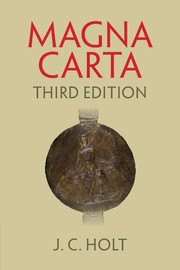Book contents
- Frontmatter
- Dedication
- Contents
- List of plates
- Preface to third edition
- Preface to second edition
- Preface to first edition
- Acknowledgements
- Abbreviations
- Introduction
- 1 The Charter and its history
- 2 Government and society in the twelfth century
- 3 Privilege and liberties
- 4 Custom and law
- 5 Justice and jurisdiction
- 6 Crisis and civil war
- 7 Quasi Pax
- 8 The quality of the Great Charter
- 9 The achievement of 1215
- 10 From distraint to war
- 11 The re-issues and the beginning of the myth
- Appendices
- 1 The meeting at Bury St Edmunds, 1214
- 2 Notification of Thomas count of Perche, February 1215
- 3 Triplex forma pacis
- 4 The ‘unknown’ charter
- 5 The Articles of the Barons
- 6 Magna Carta, 1215
- 7 Translations of the Charters
- 8 The Twenty-Five barons of Magna Carta, 1215
- 9 The date of the London treaty
- 10 The Oxford Council, 16–23 July 1215
- 11 Select documents illustrative of the history of Magna Carta, 1215
- 12 Magna Carta, 1225
- 13 Charter of the Forest, 1225
- 14 Liberties and perpetuity
- References
- Index
- Plate section
10 - The Oxford Council, 16–23 July 1215
from Appendices
Published online by Cambridge University Press: 05 July 2015
- Frontmatter
- Dedication
- Contents
- List of plates
- Preface to third edition
- Preface to second edition
- Preface to first edition
- Acknowledgements
- Abbreviations
- Introduction
- 1 The Charter and its history
- 2 Government and society in the twelfth century
- 3 Privilege and liberties
- 4 Custom and law
- 5 Justice and jurisdiction
- 6 Crisis and civil war
- 7 Quasi Pax
- 8 The quality of the Great Charter
- 9 The achievement of 1215
- 10 From distraint to war
- 11 The re-issues and the beginning of the myth
- Appendices
- 1 The meeting at Bury St Edmunds, 1214
- 2 Notification of Thomas count of Perche, February 1215
- 3 Triplex forma pacis
- 4 The ‘unknown’ charter
- 5 The Articles of the Barons
- 6 Magna Carta, 1215
- 7 Translations of the Charters
- 8 The Twenty-Five barons of Magna Carta, 1215
- 9 The date of the London treaty
- 10 The Oxford Council, 16–23 July 1215
- 11 Select documents illustrative of the history of Magna Carta, 1215
- 12 Magna Carta, 1225
- 13 Charter of the Forest, 1225
- 14 Liberties and perpetuity
- References
- Index
- Plate section
Summary
One of the most important features of Mr Richardson's original paper on ‘The Morrow of the Great Charter’ was the emphasis he gave to the assembly held at Oxford in the third week of July. ‘This July meeting’, he wrote, ‘for which the evidence is exceptionally abundant, has been ignored or implicitly denied by historians. But it is vitally important if the sequence of events is to be understood. The broad result of the meeting was to carry a stage further the Concordia of Runnymede.’
This view differs radically from the one advanced above. The main points of difference are as follows.
(1) Richardson equated the triplex forma pacis with Magna Carta and not, as has been argued above, with the papal forma of March. This meant that he could interpret the approval which the papal commissioners expressed for the forma in September as approval of Magna Carta, and this in turn supported his hypothesis that the agreement was still being amplified in July. On the correct dating of the triplex forma pacis see appendix 3, above, pp. 341–4.
(2) He made the avowed presumption that the administrative changes and other measures taken at or about this time were taken by conciliar decision. For this there is no direct evidence. He rightly drew attention to an entry on the K. R. Memoranda roll of 2 Henry III, which states that William fitz Roscelin held the counties of Norfolk and Suffolk as the deputy of the baronial sheriff, Roger de Cressy, until 1 August, when a council was held at Oxford, and then the king committed the counties to Hubert de Burgh. Letters patent notifying Hubert's appointment were in fact dated 24 July at Woodstock, the day after John left Oxford. Now this entry on the Memoranda roll obviously associates this particular administrative change with the Oxford council, but it gets the date of the council wrong, it does not state directly that Hubert's appointment was made at Oxford and it certainly does not permit us to assume that the change was made ‘by common agreement’ at the council.
- Type
- Chapter
- Information
- Magna Carta , pp. 407 - 411Publisher: Cambridge University PressPrint publication year: 2015



